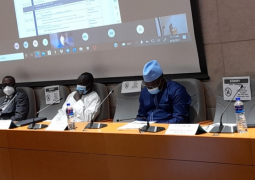
He made this statement at the launching of the nationwide awareness raising campaign and distribution of efficient cook stoves held at the Petroleum House yesterday.
“As a Sahelian country with high rate of desertification, coupled with high dependency on the forest for energy, The Gambia faces high risk of ecological catastrophe if necessary countermeasures are not taken soon.” He added that the government, together with development partners is taking measures to address the loss of the country’s forest cover including reducing high dependency on the forest for energy.
“An assessment of the energy balance of The Gambia has revealed that biomass energy constitutes about 80 percent of the total energy demand of the country. The biomass energy which is used for cooking also constitutes over 95 percent of domestic or cooking energy in The Gambia.
This is a very high proportion of the energy balance, which indicates the heavy dependency of the country on the forest for energy,” the Energy minister further revealed.
Mr. Sanyang acknowledged that the energy sector is contributing to a great loss of natural vegetation due to the rapid loss of forest cover, adding that Energy is a very critical ingredient of the socioeconomic development of any country.
Christophe Yretot, the representative of United Nations Industrial Development Organisation, suggested that The Gambia promotes inclusive, environmentally-sound and low-carbon development by catalysing investment in improved cook stoves and alternative cooking solutions as it would simultaneously create green jobs and shared prosperity.
“This project will also support the articulation of energy policies on land resource management strategies as a timely response to the threat of deforestation and unsustainable wood fuel production.” The project, he added, recognises women's role in the use of local natural resources and would therefore contribute to building their capacities and ensuring their effective participation in management of alternative energy supply options throughout the value chains ensuring that both men and women equally benefit and contribute to the creation of environmental and social benefits.
“By developing a thriving global market for clean and efficient cook stoves and fuels, we can transform the way the world cooks,” he said.
The objective of the launch of the campaign is to raise the awareness level of the public on efficient and clean modes of cooking as well as distribute efficient cook stoves and alternative cooking fuels thereby reducing the fuel wood consumption and promote sustainable management of the country’s scarce forest resources.





